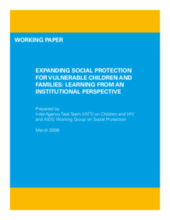Social protection, including social transfers and social services for the most vulnerable and marginalized, is gaining momentum as a development priority. Increased attention from governments, NGOs, academic institutes and donors is being accompanied by new calls to strengthen national Governments to coordinate, regulate, and in some cases implement social protection programmes at scale. In order to take up this role, there is increased recognition of the need to strategically locate social protection leadership with the appropriate Government ministry to maximize effectiveness. However, there remains debate about which ministry is best placed to move the social protection agenda forward, given cross cutting implications for numerous Government structures and departments. Despite this recognition and debate, there has been little documentation of lessons learned from strengthening lead ministries; discussions at national levels about the location of leadership, coordination and other key functions; and the drivers of change leading to successful expansion of social protection programming. The IATT Social Protection Working Group undertook a review of these experiences and debates in selected countries that either have established national social protection programmes or are in the process of developing them. The review aims to shed light on the institutional dynamics of expanding social protection with the goal of informing current and future efforts. Ensuring benefits for children was a particular focus, in light of their lack of access to social protection and their heightened vulnerability to the long-term consequences of poverty. Countries reviewed include Ghana, Malawi, South Africa, Uganda, Zambia, Ukraine, Brazil, and Chile.
©Inter Agency Task Team Social Protection Working Group

